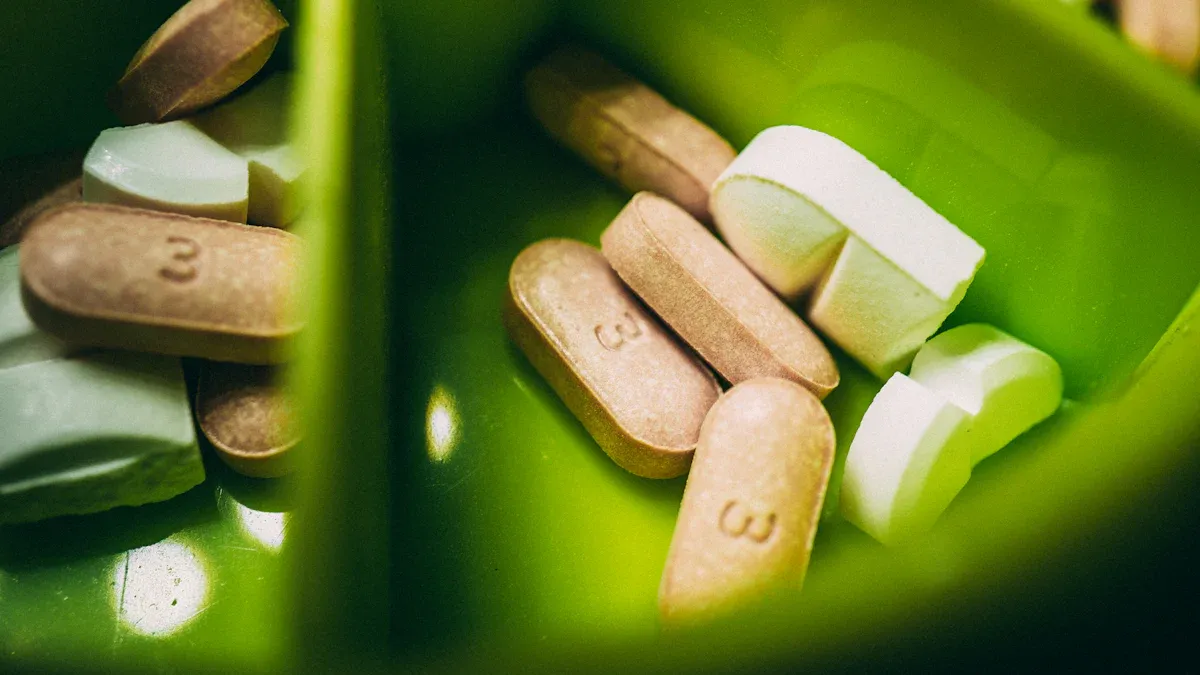Mental Health Benefits of Methyl Folate in 2025
Table of Contents

Recent studies show methylfolate supplementation can help improve your mental health.
| Study Title | Year | Findings |
|---|---|---|
| L-Methylfolate May Offer Modest Boost to Antidepressants | 2024 | Effective for treatment-resistant depression. |
| Effect of Combination Therapy of Methylfolate with Antidepressants | 2024 | Notable improvements in depressive symptoms. |
You see more people interested in nutrition for mental wellness.
- Research on nutrition and mental health keeps increasing.
- Market growth for methylfolate supplements continues, driven by rising awareness and new healthcare initiatives.
The way methylfolate works makes it important for mood and brain function. You gain practical, science-based insight into its Mental Health Benefits.
Mental Health Benefits

Methylfolate and the Brain
You may wonder how methylfolate affects your brain. Methylfolate plays a key role in keeping your brain cells healthy. It helps your body make DNA and RNA, which are important for cell growth and repair. You also need methylfolate to build myelin, the protective layer around your nerve cells. This layer helps your nerves send signals quickly and keeps your brain working well.
Methylfolate helps your body lower homocysteine, a substance that can harm your brain if it builds up. High homocysteine levels may lead to problems with memory and thinking. By supporting homocysteine reduction, methylfolate can help protect your cognitive function.
| Mechanism | Description |
|---|---|
| Homocysteine Reduction | Methylfolate converts homocysteine into methionine, potentially lowering levels associated with cognitive decline. |
| DNA Methylation | Involvement in DNA methylation processes is crucial for gene expression regulation, with alterations noted in Alzheimer’s patients. |
| Anti-Inflammatory Effects | Folic acid supplementation may reduce inflammation, a factor in Alzheimer’s disease progression. |
You see that methylfolate supplementation supports your mental health benefits by keeping your brain cells strong and helping your nerves work better. If you have low folate levels, you may notice problems with memory or thinking. Folate deficiency can lead to cognitive decline, but taking supplements may improve your cognitive function, especially as you get older.
Neurotransmitters
Your brain uses chemicals called neurotransmitters to send messages. Methylfolate is the only form of folate that can cross the blood-brain barrier and help your brain make neurotransmitters like serotonin and dopamine. These chemicals control your mood, motivation, and appetite.
If you do not get enough folate, your body cannot make enough serotonin and dopamine. This can lead to mood disorders such as depression and anxiety. You may feel sad, tired, or have trouble enjoying things you used to like. Methylfolate supplementation can help your body produce these neurotransmitters and support your mental health benefits.
- Methylfolate is essential for the production of neurotransmitters such as serotonin and dopamine.
- Low folate levels can hinder the synthesis of these neurotransmitters, affecting mood and motivation.
- Methylfolate supplementation may improve symptoms of depression and anxiety by boosting neurotransmitter levels.
| Study Type | Findings |
|---|---|
| Double-blind, placebo-controlled trial | Adding l-methylfolate 7.5 or 15 mg to standard therapy significantly improved clinical and social recovery in folate-deficient patients with major depressive disorder. |
| Multicenter study | Adding l-methylfolate to standard psychotropic medication significantly improved clinical recovery in depressed patients with folate deficiency. |
| Retrospective analysis | Patients treated with l-methylfolate plus an SSRI/SNRI showed more effective improvement in depressive symptoms compared to those on monotherapy. |
You may notice that methylfolate supplementation works best for people who have low folate levels. If you have depression or anxiety, your doctor may check your folate levels before starting treatment. Studies show that adding methylfolate to medications can help you feel better faster and improve your mental health benefits.
Inflammation
Inflammation in your body can affect your brain and your mental health. Clinical studies show that methylfolate can lower inflammation markers in people with depression. If you have treatment-resistant depression, methylfolate supplementation may help you respond better to medications.
Tip: If you have symptoms of depression that do not improve with standard treatment, ask your doctor about checking your folate levels. You may benefit from methylfolate supplementation.
| Treatment Group | Improvement at 2 Weeks | Improvement at 4 Weeks | Statistical Significance |
|---|---|---|---|
| Group B (Methylfolate + Antidepressants) | 18.49% | 40.33% | p-value ≤ 0.05 |
| Study Focus | Findings | Conclusion |
|---|---|---|
| Folate deficiency and cognitive decline | Impaired DNA repair in neuronal cells due to folate deficiency leads to cognitive decline. | Folate supplementation may improve cognitive function in older adults. |
| Methylfolate with other vitamins | More pronounced cognitive improvements when combined with B12 and B6. | Combination therapy may be more effective than methylfolate alone. |
| Methylfolate and antidepressants | Significant improvements in depression symptoms when added to SSRI treatment. | Methylfolate may enhance the effectiveness of antidepressants. |
You see that methylfolate supplementation not only helps with depression but also supports your cognitive function. If you have low folate levels, you may not respond well to standard medications. Early intervention with supplements can improve your mental health benefits and help you feel better.
| Evidence | Description |
|---|---|
| Serum Folate Levels | Patients with depression had significantly lower serum concentrations of folic acid compared to those with anxiety (p=0.04). |
| Correlation with Depression Severity | An inverse correlation was found between folic acid levels and Beck’s inventory score among patients with severe depression (r=-0.250, p=0.049). |
| Treatment Efficacy | Higher efficacy of adjunctive L-methyl-folate in combination with SSRIs was reported for improving depression symptoms compared to placebo. |
- Nutritional variables, including folate levels, are significant predictors of severe depression.
- Early intervention is crucial for individuals with major depression who have low folate levels.
- Low folate levels may lead to poor responses to standard antidepressant treatments.
You can see that maintaining healthy folate levels is important for your mental health benefits. Methylfolate supplementation gives you a practical way to support your brain, improve your mood, and help with depression and cognitive function.
Methylfolate Supplementation for Depression

L-Methylfolate for Depression
You may hear about l-methylfolate for depression when you look for new ways to improve your mental health. L-methylfolate is the active form of folate. Your body uses it to help make neurotransmitters like serotonin, which play a big role in mood regulation. Many doctors now recommend methylfolate supplementation for people who do not respond well to regular antidepressant medication.
L-methylfolate works by helping your brain produce chemicals that control mood and motivation. If you have low folate levels, you may notice more symptoms of depression or anxiety. Methylfolate supplementation can help your body use folate better, especially if you have folate deficiencies or trouble absorbing regular supplements.
Studies show that l-methylfolate for depression can help people who do not get better with standard medications. One case study showed that a woman with treatment-resistant depression improved after taking 15 mg of l-methylfolate daily. Her symptoms went away, and her mood returned to normal. Doctors often use methylfolate supplementation as an add-on to other treatments for major depressive disorder.
| Findings | Description |
|---|---|
| Improvement in depression scale scores | l-Methylfolate enhances scores on depression scales when used as an adjunct therapy. |
| Increased patient response rates | Patients show better response rates when l-Methylfolate is included in their treatment. |
| Higher remission rates | The use of l-Methylfolate is associated with increased rates of remission in depressive symptoms. |
Clinical Outcomes
You may wonder how well methylfolate supplementation works for depression. Clinical studies show that adding l-methylfolate to antidepressant medication can improve your chances of feeling better. Doctors often use 15 mg per day as the recommended dosage. Lower doses, such as 7.5 mg, do not show the same results.
- In two randomized controlled trials, patients who took 15 mg/day of l-methylfolate had a response rate of 32.3%. Those who took a placebo had a response rate of only 14.6%.
- A 12-month open-label study found that 38% of patients recovered fully with methylfolate supplementation.
- Another large study showed a response rate of 67.9% for patients using l-methylfolate, with an average drop of 8.5 points in the PHQ-9 depression score.
You see that methylfolate supplementation can help you if you have depression that does not improve with regular medications. Doctors also found that patients had better scores on depression rating scales and more improvement in cognitive function. The active form of folate helps your brain work better and may reduce symptoms like brain fog and low motivation.
- Dosages studied: 7.5 mg and 15 mg of l-methylfolate.
- 7.5 mg/day did not show improvement compared to placebo.
- 15 mg/day improved response rates (32.3% vs 14.6%) and HAM-D score improvement (−5.58 vs −3.04).
- Secondary outcomes showed better results in severity and symptom scales.
Note: If you have depression and do not feel better with your current medications, ask your doctor about methylfolate supplementation. You may need a higher dose to see results.
Who Should Use It
You may benefit from methylfolate supplementation if you have certain symptoms or health conditions. People with low folate levels often see the most improvement. If you have major depressive disorder, methylfolate can help you feel better when added to your treatment plan. You may also notice benefits if you have brain fog, low motivation, or trouble with cognitive function.
| Population Type | Benefit from L-Methylfolate Supplementation |
|---|---|
| Individuals with low folate levels | Likely to experience improved mental health outcomes |
| Those not responding to traditional antidepressants | May see significant reduction in depressive symptoms when supplemented |
| Patients with major depressive disorder (MDD) | Show greater improvement when l-methylfolate is added to treatment |
You may want to try methylfolate supplementation if you have depression that does not respond to regular antidepressant medication. Doctors also recommend it for people with folate deficiencies or those who have trouble absorbing folate from food. If you have mood disorders, methylfolate can help your brain make the chemicals needed for mood regulation.
Methylfolate supplementation is safe for most people. You should talk to your doctor before starting any new supplements. Your doctor can check your folate levels and help you choose the right dosage. If you have symptoms like low mood, brain fog, or reduced motivation, methylfolate may be an effective treatment for you.
Safety and Usage
Side Effects
You may notice some side effects when you start methylfolate supplementation. Most people tolerate it well, but some experience mild to moderate symptoms. Common side effects include:
- sore muscles and aches
- acne or rash
- insomnia and irritability
- severe anxiety
- nausea, headaches, and migraines
- allergic reactions
- flatulence or abdominal distention
- bitter or bad taste
- loss of appetite
- impaired judgment or overactivity
- excitement or difficulty concentrating
- confusion
- changes in sleep patterns
You might feel these symptoms soon after starting or increasing your dose. Most side effects go away if you lower your dose or stop taking the supplement. If you have trouble sleeping or feel anxious for more than a week, talk to your doctor.
Risks
Some people have a genetic change called the MTHFR gene variant. This can affect how your body uses folate.
The MTHFR gene is responsible for converting folic acid into its active form (5-MTHF). When this does not happen properly, folic acid can build up in your body. People with this gene variant may have higher risks of health problems, including depression and heart disease.
Methylfolate should only be taken under a doctor’s care. Taking too much can block natural folate from working, which may cause problems similar to those seen in people with severe MTHFR mutations.
If you take psychiatric medications, methylfolate can sometimes boost their effects. Doctors often use it with antidepressants for resistant depression. You should always let your doctor know about all medicines you take.
Who Should Avoid It
Some people should not use methylfolate supplements. You need to be careful if you have certain health conditions or take specific medicines.
| Contraindication | Explanation |
|---|---|
| Allergic Reaction to L-methylfolate | Avoid if allergic to L-methylfolate or its components due to potential severe reactions. |
| Pernicious Anemia or Other B12 Deficiencies | Can mask symptoms of B12 deficiency, risking irreversible nerve damage. |
| Seizure Disorders | May lower seizure threshold, increasing seizure risk in individuals with epilepsy. |
- People with bipolar disorder should get screened before using methylfolate, as it may trigger manic episodes.
- You need enough vitamin B12 before starting methylfolate to protect your nerves.
- If you take antiepileptic drugs, methylfolate may change how these medicines work.
- Those with adrenal fatigue or other chronic illnesses should ask a doctor before starting.
- Always discuss possible drug interactions with your healthcare provider.
Doctors recommend starting with a low dose and checking your blood for folate and homocysteine levels. Regular monitoring helps you stay safe and supports your cognitive and mental health.
You can support your mood, anxiety, and cognitive function by considering methylfolate supplements. Studies show benefits for depression, but side effects may occur.
| Study | Findings |
|——-|———-|
| Adjunctive folate for major mental disorders | Efficacy for MDD, not schizophrenia. |
- Always consult your doctor before starting new supplements.
FAQ
Can you take methylfolate with antidepressants?
Yes, you can take methylfolate with antidepressants. Doctors often recommend it for people who do not respond well to standard medication.
How long does it take to notice benefits from methylfolate?
You may notice improvements in mood or energy within two to four weeks. Results vary depending on your folate levels and health.
Is methylfolate safe for children and teens?
| Age Group | Safety |
|---|---|
| Children | Use only with doctor’s advice |
| Teens | Safe with medical supervision |

Poseidon
Master of Nutritional Epidemiology, University of Copenhagen, Herbal Functional Nutrition Researcher
Focus: The scientific application of natural active ingredients such as Tongo Ali, Horny Goat Weed, and Maca to sexual health and metabolic regulation.
Core Focus:
Men: Use a combination of Tongo Ali (an energizing factor) + Maca (an energy reserve) to improve low energy and fluctuating libido.
Women: Use a combination of Horny Goat Weed (a gentle regulator) + Maca (a nutritional synergist) to alleviate low libido and hormonal imbalances.
Stressed/Middle-Aged Adults: This triple-ingredient synergy supports metabolism, physical strength, and intimacy.
Product Concept:
Based on traditional applications and modern research (e.g., Tongo Ali promotes testosterone-enhancing enzyme activity, and icariin provides gentle regulation), we preserve core active ingredients and eschew conceptual packaging—using natural ingredients to address specific needs.
Simply put: I'm a nutritionist who understands "herbal actives." I use scientifically proven ingredients like Tongo Ali, Epimedium, and Maca to help you make "sexual health" and "nutritional support" a daily routine.
